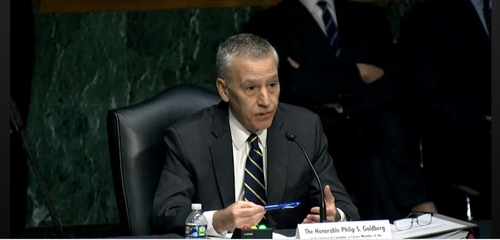 |
Philip Goldberg, a career ambassador and nominee for new US ambassador to South Korea, is seen testifying in his confirmation hearing before the Senate Committee on Foreign Services in Washington on Wednesday in this image captured from the committee's website. (Senate Committee on Foreign Services) |
WASHINGTON -- The United States and its allies must resolutely pursue a complete, verifiable and irreversible denuclearization (CVID) of North Korea, the nominee for US ambassador to South Korea said Thursday.
Philip Goldberg also said North Korea may stage additional provocations amid suspicions that Pyongyang may be preparing to conduct a nuclear test.
"Comprehensive, verifiable, irreversible denuclearization -- those are difficult goals, but they fit very well with our non-proliferation goals," he said in his confirmation hearing before the Senate foreign services committee.
"They fit with our policy of deterrence, building, broadening, deepening our alliances with the Republic of Korea, and doing all possible to defend against a rogue regime in North Korea that is violating at every opportunity UN resolutions, their own commitments, international agreements," he added, referring to South Korea by its official name.
The remarks come after North Korea staged 12 rounds of missile launches this year, including the test firing of an apparent intercontinental ballistic missile (ICBM) on March 24 that ended its self-imposed moratorium on long-range missile testing that had been in place since November 2017.
Officials here and in Seoul have also noted North Korea appeared to be repairing underground tunnels at the Punggye-ri nuclear test site, the site of all six nuclear tests so far that the North had purportedly demolished in 2018 to show its willingness to denuclearize.
The Joe Biden administration is believed to have refrained from using the term CVID, at least publicly, vowing to seek a practical and calibrated approach to completely denuclearize the Korean Peninsula, as opposed to North Korea.
Goldberg, who served as coordinator for implementation of UN Security Council sanctions on North Korea in 2009-2010, insisted the US must be "resolute" about its CVID goals.
"So it is a very difficult problem. If we don't admit it, I'm admitting it here. But it's one that we need to continue to work on and be quite resolute about," he said.
Goldberg, who is a career ambassador, the highest diplomatic rank in US foreign service, also underscored the need to deal resolutely against North Korean provocations, noting the recalcitrant country may engage in additional activities that he said were "outrageous" and "deeply troubling."
"I think our Special Representative for North Korea Sung Kim said just yesterday that we expect more (provocations), especially with some of the celebrations upcoming in North Korea," he said, referring to the 110th anniversary of the birthday of the North's late founding leader Kim Il-sung next Friday.
"We have to react with enhanced deterrence, with a solid alliance between the United States and South Korea, Japan, and working together to thwart these threats from North Korea when sanctions are available and enforceable, to also continue with very strong implementation," he added.
Goldberg noted sanctions alone may not convince North Korea to denuclearize, but said they must be maintained and implemented, insisting that Pyongyang wants them eased or removed for a reason.
"North Korea wants those sanctions lifted, which is a reason to keep pressing because they want them lifted for a reason," he said when asked about the efficacy of the existing sanctions on North Korea.
He added, "They are an important element but they're not an element that will necessarily do the trick by themselves."
Goldberg also highlighted the importance of trilateral cooperation between South Korea, Japan and the US
"There are reasons that two democratic, technologically advanced, scientifically advanced countries should be working together more not just on the North Korea issue, which has been an issue where they have come together, but also on other issues regionally and around the world," he said.
Goldberg was nominated to be the new US ambassador to Seoul on Feb. 11. If confirmed, he will replace Harry Harris, who stepped down early last year when Biden took office. (Yonhap)







![[Today’s K-pop] Blackpink’s Jennie, Lisa invited to Coachella as solo acts](http://res.heraldm.com/phpwas/restmb_idxmake.php?idx=644&simg=/content/image/2024/11/21/20241121050099_0.jpg)